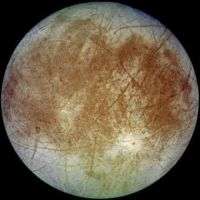December 12, 2008 weblog
Scientist Explains Why Jupiter's Moon Europa Could Have Energetic Liquid Oceans

(PhysOrg.com) -- Scientists used to think that Jupiter and its moons - and most other bodies orbiting far from the Sun - were cold, icy, and probably barren. When the Voyager spacecraft flew by in the late '70s, its images of liquid on Jupiter's moons surprised scientists. The images showed that the moon Io had liquid sulfur volcanoes, and the moon Europa contained a liquid ocean under the frozen crust.
Scientists weren't sure why Europa's liquid oceans didn't freeze when they're so far from the Sun. Generally, researchers thought that Jupiter kept Europa's oceans warm by generating tidal forces on the moon, which caused the moon to flex during its eccentric orbit, and this energy caused the oceans to heat up. A top layer of ice would insulate the liquid underneath, trapping the heat.
Now, a recent study published in Nature has proposed another heating method, one that could provide considerably larger amounts of heat to maintain more energetic liquid oceans on distant moons. As author Robert Tyler, an oceanographer from the University of Washington, explains, Jupiter may keep Europa's oceans warm by generating large planetary waves on the moon. Since Europa tilts on its axis (just like the Earth and many other celestial bodies do), a previously unconsidered kind of tidal force could generate planetary waves called Rossby waves. Owing to our planet's oblique orbit, Earth also has Rossby waves that travel from East to West across its oceans.
Although Rossby waves travel quite slowly, at just a few kilometers per day, they can generate significant kinetic energy. Tyler calculated that if Europa has an axial tilt of just one degree, the resonance from Rossby waves would produce 7.3 x 1018 J of kinetic energy, which is two thousand times larger than that of the flow excited by the dominant tidal forces.
If true, the warming method could mean that Europa's oceans aren't as calm as previously thought. Under the icy surface layer, very energetic oceans could be sloshing around, Tyler said. He added that the same warming method could apply to other moons of Jupiter and Saturn. Previous studies have suggested that energetic oceans could offer an environment with a higher potential for life, although other factors - such as the ocean's chemistry - would also play important roles.
More information: Tyler, Robert H. "Strong ocean tidal flow and heating on moons of the outer planets." Nature 456, 770-772 (11 December 2008), doi:10.1038/nature07571
via: Arstechnica and National Geographic
© PhysOrg.com





















